
by Admin | Apr 30, 2014 | News

(Photo Credit: Stephen Crowley/The New York Times)
(BGF) – Recently Mark Landler, writing for The New York Times, discussed President Obama’s trip to Asia in light of the U.S. relations with China. As Landler notes in the article, President Obama’s comments on the trip walk a fine line between reassuring U.S. allies, such as Japan and South Korea, without antagonizing or isolating China. While the U.S. has reaffirmed its commitment to its allies in the region, the U.S. has made it clear that it wants to avoid confrontation with China and that China should be careful not to follow in Russia’s aggressive footsteps. Avoiding conflict is in the interest of both China and the U.S. An excerpt of the article is provided below. Click here to read the full article or visit The New York Times website.
On a Trip That Avoids Beijing, Obama Keeps His Eye on China
By Mark Landler
KUALA LUMPUR, Malaysia — On every stop of his Asian journey in the past week, President Obama has spoken to two audiences: America’s allies and China. The balancing act has become even trickier because of the sharp deterioration in America’s relations with Russia.
Perhaps no country has more to gain from a new Cold War than China, which has historically benefited from periods of conflict between the United States and Russia and, analysts say, could exploit these latest tensions to lean even harder on its neighbors in the region.
As Mr. Obama has traveled from Japan to South Korea and, now, Malaysia, he has delivered a carefully calibrated message to reassure America’s friends of its support while discouraging the Chinese from any thoughts of opening a second front on the Pacific Rim.
In Tokyo on Thursday, Mr. Obama vowed to defend Japan in a territorial dispute with China, but urged the Japanese to show restraint and insisted that he wanted solid relations with Beijing. The next day in Seoul, the South Korean capital, he pledged to defend South Korea from the renegade North, a Chinese ally, but went out of his way to enlist Beijing in that effort.
“We’re not interested in containing China,” Mr. Obama said, even as he embarked on what some experts said could be portrayed as a “containment tour,” visiting four countries that worry about Chinese expansionism while skipping Beijing itself.
“We’re interested in China’s peaceful rise and it being a responsible and powerful proponent of the rule of law,” Mr. Obama insisted. But he added, “In that role, it has to abide by certain norms.”
The president laid out a vivid case for why China should not mimic Russia’s adventurism. The escalating sanctions against Russia for its threats to Ukraine, he said, will weaken an economy already challenged by its reliance on oil and gas.
The portrait Mr. Obama painted of Russia was withering. Speaking in Tokyo, he said Russia “needs to diversify its economy, because the rest of the world is moving further and further off the fossil fuels that are the primary way that Russia is able to bankroll itself.”
By playing up Russia’s weaknesses and predicting that they will worsen because of President Vladimir V. Putin’s aggression, Mr. Obama seemed to be saying to Chinese officials who might be contemplating closer ties with Moscow: Stick with a winning team.
“The message is: ‘Don’t think that what Putin is doing in eastern Ukraine is so brilliant that you should be inspired by it. Don’t think that this is a model that could work for you,’ ” said Jeffrey A. Bader, who was the senior China adviser on the National Security Council until 2011.
Mr. Bader warned last week that a few poorly chosen phrases could turn Mr. Obama’s trip into a containment tour. But he said the president had gotten the balance right in Japan and South Korea, robustly reaffirming America’s support for its treaty allies while avoiding statements that would isolate or antagonize China.
So far, China’s reaction has been muted. The Chinese Ministry of Foreign Affairs issued a perfunctory objection to Mr. Obama’s assertion that the American security treaty with Japan obligates the United States to protect a clump of islands in the East China Sea that are administered by Japan but claimed by both Japan and China.
But it has been silent since then, much as it abstained from the debates in the United Nations over Russia’s actions in Crimea. China, some analysts said, is content not to pick a fight with the United States at a time when events, in Asia and elsewhere, seem to be going in its favor.
Leaders in Japan and South Korea said they were reassured by Mr. Obama’s words. But among experts in both countries, there was lingering uneasiness about the depth of American resolve.
“The wording of his statements was O.K., but if you look at his demeanor and tone, he was very nuanced and trying not to get entangled in disputes with China,” said Narushige Michishita, an expert on security policy at the National Graduate Institute for Policy Studies in Tokyo.
Click here to continue reading.
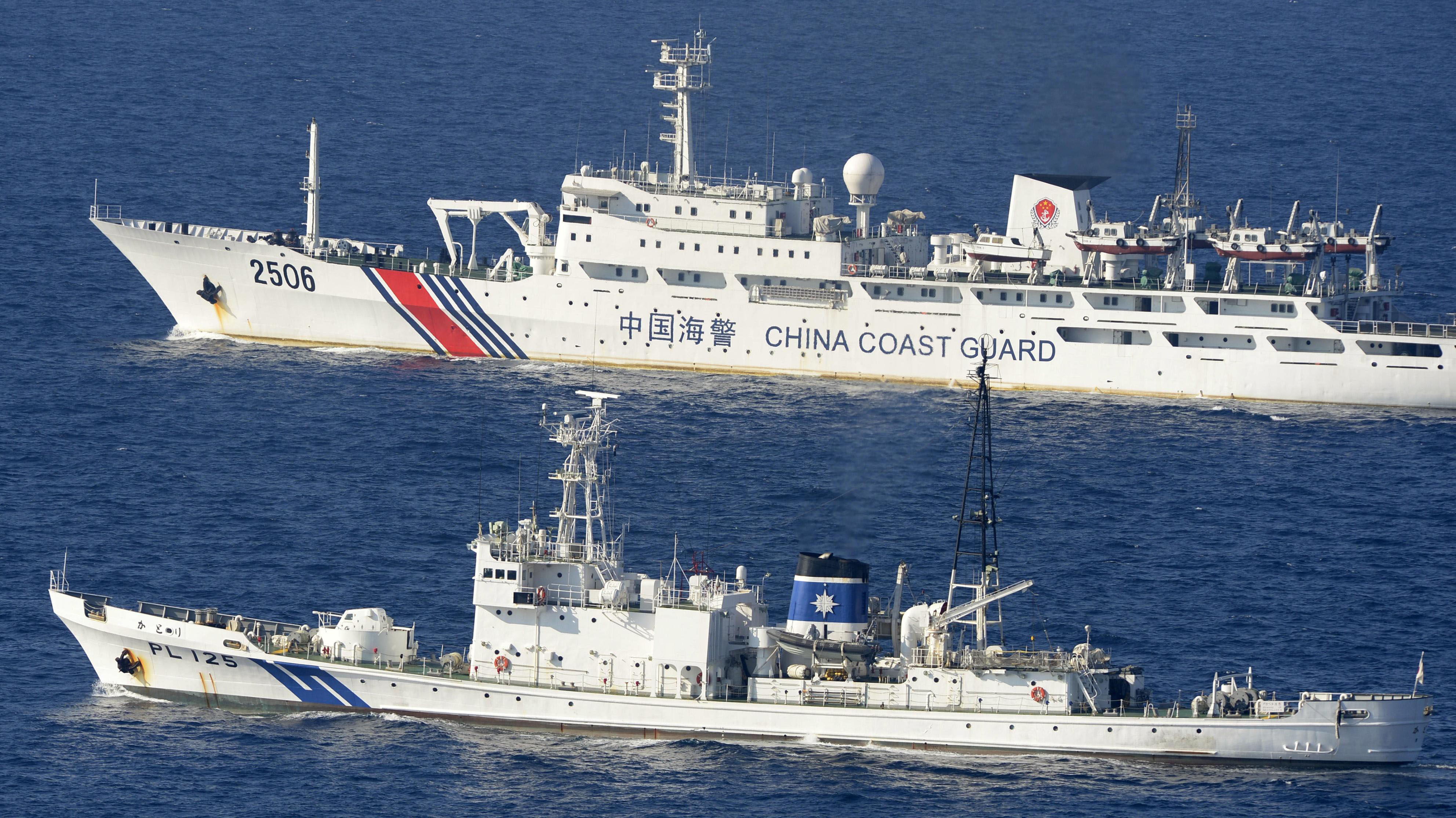
by Admin | Apr 28, 2014 | News
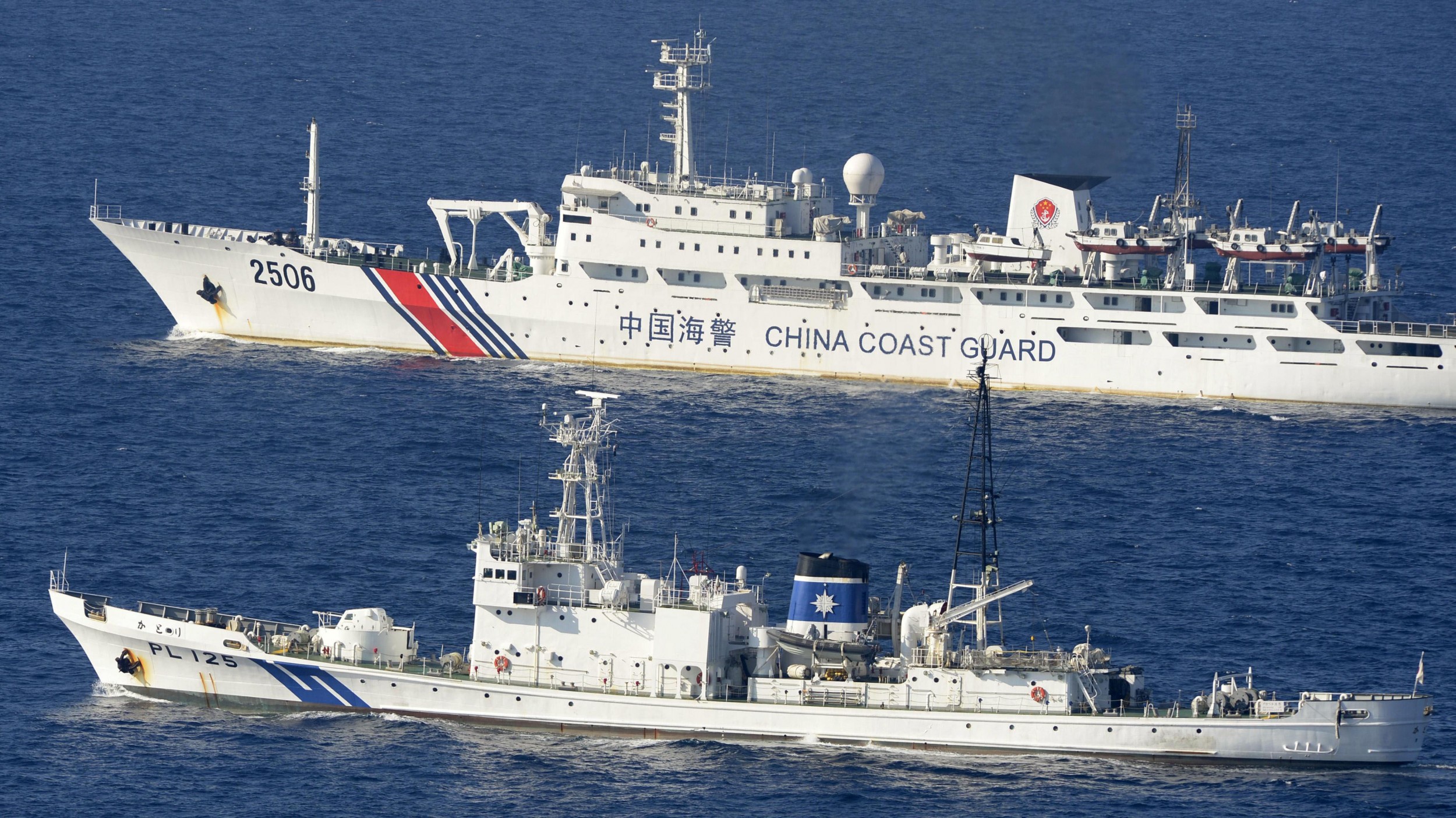
(Photo Credit: Kyodo News via AP)
(BGF) – On April 23, 2014 The New York Times reported on a recent deal, the Code for Unplanned Encounters at Sea, endorsed by the United States, Japan, and China. The Code for Unplanned Encounters at Sea is a non-binding protocol that is designed to help develop “rules of the road” for encounters between maritime vessels. The hope is that developing these rules, embodied in the code, will help reduce potential incidents at sea that could result in an escalation of military or diplomatic tensions. This is particularly important given recent encounters between U.S. and Chinese vessels, and Chinese and Japanese vessels in the dispute over the Senkaku/Diaoyu Islands. Click here to read the full article or visit The New York Times website.
Pacific Rim Deal Could Reduce Chance of Unintended Conflict in Contested Seas
By Austin Ramzy and Chris Buckley
TAIPEI, Taiwan — A naval code of conduct approved by more than 20 nations around the Pacific, including China, Japan and the United States, could reduce the risk of accidental encounters’ spiraling into conflict, experts said. But Beijing’s firm rejection of President Obama’s comments on Wednesday about islands claimed by both China and Japan underscored the maritime tensions that continue to trouble Asia.
The Code for Unplanned Encounters at Sea was endorsed Tuesday by naval officials from the United States, China, Japan and other states at a symposium in the northeastern Chinese port city of Qingdao, China’s state-run Xinhua news agency reported.
The agreement comes at a time of growing concern about territorial disputes between China and some of its neighbors. China claims islands controlled by Japan in the East China Sea known as the Senkaku in Japan and the Diaoyu in China. Several countries, including China, Vietnam and the Philippines, have overlapping maritime claims.
Mr. Obama, who arrived in Japan on Wednesday to begin a trip that will also include South Korea, Malaysia and the Philippines, told a Japanese newspaper that the disputed islands fell under the United States-Japanese mutual defense treaty. “And we oppose any unilateral attempts to undermine Japan’s administration of these islands,” he said in a written response to the newspaper, The Yomiuri Shimbun.
A Chinese Ministry of Foreign Affairs spokesman, Qin Gang, said Wednesday that China was “firmly opposed to treating the U.S.-Japan security treaty as applying to the Diaoyu Islands.”
“The United States should respect the facts, in a responsible manner abide by its commitment not to choose sides over a territorial sovereignty issue, be cautious on words and deeds, and earnestly play a constructive role for peace and stability in the region,” Mr. Qin said during a news conference.
Encounters between military vessels in the region have prompted concerns about the risk of escalation.
Last year, a Chinese Navy vessel cut within about 100 yards of the Cowpens, an American cruiser that had been monitoring China’s aircraft carrier, the Liaoning, in the South China Sea.
Chinese and Japanese vessels in the East China Sea have also had several potentially dangerous encounters in recent years. In 2013, Japan saidChinese warships used radar that helps target weapons on a Japanese military vessel and a helicopter near the disputed islands. In an interview on Tuesday, the day the rules were approved, Adm. Wu Shengli, the commander in chief of the Chinese Navy, said the tensions with Japan remained serious and the risk of incidents at sea persisted.
“Nothing can be excluded,” Admiral Wu said in the interview with Phoenix Television, a satellite service based in Hong Kong. “That’s what we often call accidental discharge when cleaning a gun. The gun is an objective fact, but what we need to study is how to avoid accidental discharge when cleaning a gun.”
Military analysts say the lack of formal “rules of the road” for encounters between vessels of major navies in the Pacific increases the risk that an incident at sea could escalate sharply, possibly causing loss of life and inciting diplomatic crises. A code on interactions between warships could help reduce unintended conflict. “Over all, I think it’s a very positive development, but it remains to be seen how effectively it will be implemented,” Ian Storey, a senior fellow at the Institute of Southeast Asian Studies in Singapore, said in an interview.
Click here to continue reading.
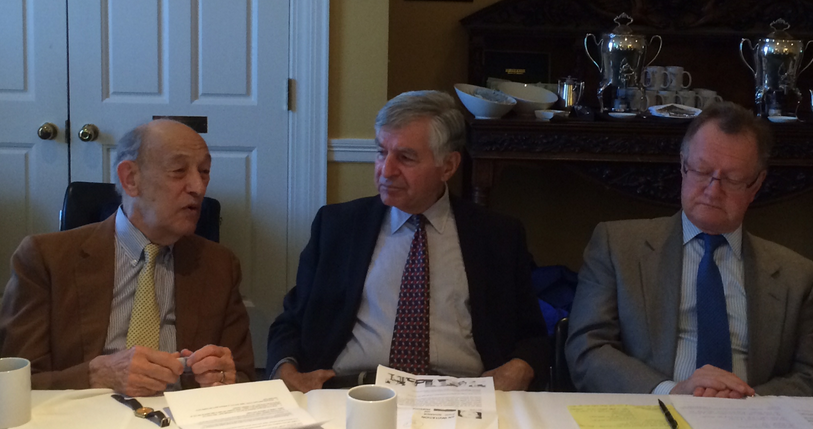
by Admin | Apr 27, 2014 | Highlights
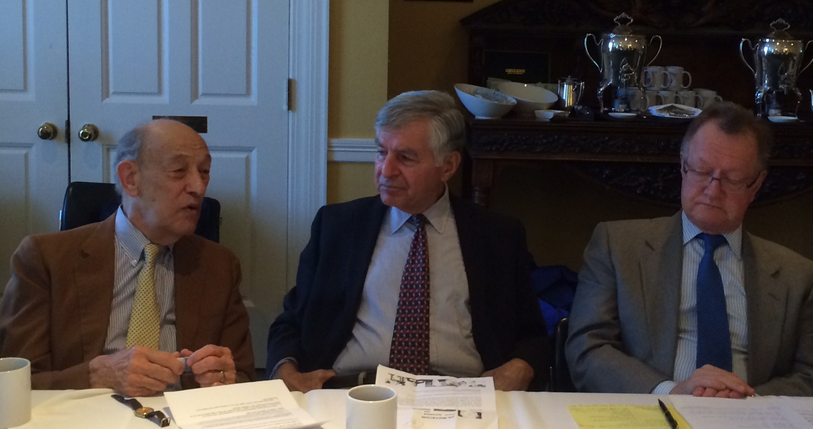
(From Left to Right: Professor Ezra Vogel, Governor Michael Dukakis, Professor John Quelch)
(BGF) – On April 24, 2014 Boston Global Forum (BGF) held a successful online, international conference addressing the conflict between Japan and China, how to resolve the conflict, and the role of the U.S. in easing those tensions. The conference featured contributions from a number of notable speakers and discussants including: Professor Joseph Nye; Professor Ezra Vogel; Governor Michael Dukakis; former Australian Prime Minister Kevin Rudd; Ambassador Sir David Warren; Professor Kosaku Dairokuno; Professor Shigeto Sonoda; Dr. Hei Seki; Professor Suzanne Ogden; and former Ambassador J.D. Bindenagel, among many others.
The opening comments were provided by Professor Ezra Vogel, the Henry Ford II Professor of the Social Sciences Emeritus at Harvard University and renowned biographer of Deng Xiaoping, and Professor Joseph Nye, University Distinguished Service Professor at Harvard University, the former Dean of the Kennedy School of Government, and a member of BGF’s Board of Thinkers. The comments provided by Professor Vogel and Professor Nye laid the foundation for the productive discussion and sought to ground the discussion in a historical understanding of the relations between Japan, China, and the United States.
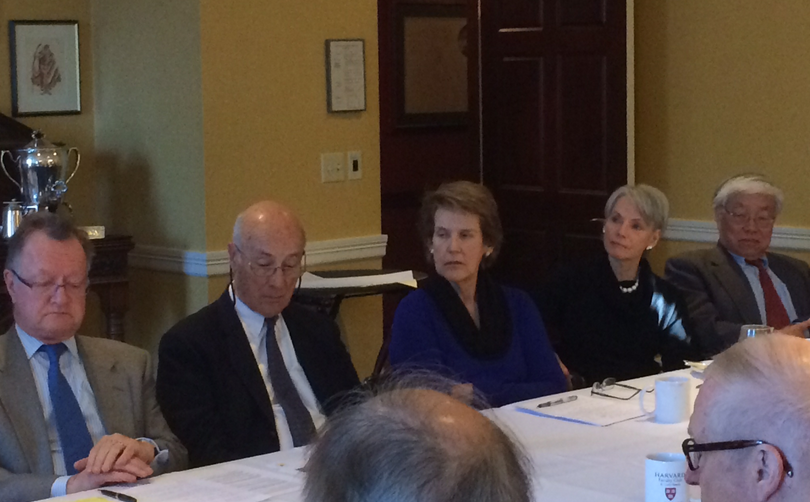 (From Left to Right: Professor John Quelch, Professor Joseph Nye, Professor Suzanne Ogden, Former CNN Corespondent Jill Dougherty and Special Economic Adviser of Prime Minister Abe, Prof. Koichi Hamada)
(From Left to Right: Professor John Quelch, Professor Joseph Nye, Professor Suzanne Ogden, Former CNN Corespondent Jill Dougherty and Special Economic Adviser of Prime Minister Abe, Prof. Koichi Hamada)
The Root of the Conflict
In the early 1970s Japan and China normalized their relations. However, as Professor Vogel noted, the two countries left many issues unresolved. These unresolved issues, which include the current tensions over the Senkaku/Diaoyu Islands, have resurfaced in recent years and are now threatening Chinese-Japanese relations. As Prime Minister Rudd noted, the dispute over the Senkaku/Diaoyu Islands is a modern manifestation of a much older problem. With regard to the Islands, Prime Minister Rudd went on to note that “Of all the recent things we have seen in China-Japan relations, this one worries me the most”.
With that said, the historical foundation laid by Professor Vogel illustrated that relations between Japan and China have not always been so tense. In fact, in 1978 Chinese Leader Deng Xiaoping sought to continue to advance the normalization of Chinese-Japanese relations. In doing so Xiaoping became the first Chinese Leader to meet the Japanese Emperor and Xiaoping also visited numerous Japanese factories and steel plants. While Xiaoping wanted to build strong business ties with Japan, he wisely wanted to build a broader base for relations than merely business ties. Accordingly, Xiaoping opted to look towards the future of the two countries, rather than continue to argue over the past.
As a result of Xiaoping’s efforts, the Chinese public viewed Japan very positively during the 1980s. However, following the Tiananmen Square incident the Chinese Communist Party, which was worried about their public support, undertook an education initiative to create an atmosphere of patriotism. One of the most successful methods the Communist Party was able to utilize to create patriotism amongst the Chinese public was to bring up World War II and Japanese actions during the war. Ultimately, the references to World War II undermined the public’s positive perceptions of Japan and stoked a strong sense of nationalism amongst the Chinese public.
Although propaganda from the Chinese Communist Party undermined the positive perception of Japan amongst the Chinese public, the truth about China’s relationship with Japan is obviously more complicated. Given that the truth is more complicated, many of the participants in April 24th’s conference argued that there is reason for hope and that there are steps that can be taken to improve relations.
Firstly, China and Japan have significant ties through trade. As Professor Kosaku Dairokuno noted, there are over 22,000 Japanese companies operating in China. Moreover, China and Japan face a similar set of problems, such as rapidly aging populations. Thus, any escalation in the conflict over the Senkaku/Diaoyu Islands could hurt both countries economically.
Secondly, improved relations could occur through a more honest, transparent discussion of Japan’s role in China’s economic success. In particular, during the early 1990s Japan played a critical role in helping China get past international economic sanctions that were being imposed on it. Additionally, as noted above, Japan and China have strong economic ties and more in common than their leaders may be willing to admit.
Thirdly, in order to facilitate an honest discussion of the relationship between China and Japan, Professor Ogden suggested that China should create Japan institutes. This would lead the development of Japanese studies scholars and allow for a better understanding of how critical Japanese investment has been for Chinese economic development as well as better and more honest understanding of Japan and its culture.
Of course, an honest and transparent discussion of China’s relationship with Japan would mean that both countries need to stop reverting to nationalist sentiments and rhetoric. Abandoning nationalist rhetoric is crucial in easing the tensions between China and Japan. As Professor Vogel illustrated, nationalist sentiments were responsible for adversely impacting Chinese-Japanese relations in the 1990s. As Prime Minister Rudd noted, particularly in the case of the Senkaku/Diaoyu Islands: “That nationalism, that patriotism, is a potent and dangerous box for either side of this relationship to draw upon in terms of dealing with domestic political problems…in this case, it’s particularly dangerous.”
Finally, China and Japan should push the issue of sovereignty over the Senkaku/Diaoyu Islands to the back burner so that it can be resolved by future generations. Several of the discussants noted that it is unlikely that Japan and China will be able to resolve the sovereignty issue over the islands anytime soon. One possible suggestion for doing this would be to turn the islands, which are uninhabited, into a marine ecological preserve – this would prevent either country from inhabiting the islands or using them for military purposes.

(Former Prime Minister of Australia, Kevin Rudd and Special Economic Adviser to Japanese Prime Minister Abe, Prof. Koichi Hamada)
The Role of the U.S.
The Obama Administration’s current policy of “rebalancing” toward Asia has its roots in the Clinton Administration’s policy towards Japan and China and reflects the Administration’s feeling that it is critical to reestablish the U.S. presence in the region. Building on the wisdom of the Clinton Administration, the U.S. is critical to establishing stable relations between the U.S., China, and Japan.
During the 1990s the Clinton Administration made it clear that they would not attempt to contain China’s emergence internationally and that the U.S. had more to fear from a weak China than a strong China. Accordingly, the U.S. sought to extend a helping hand to integrate China into the international system. However, the U.S. hedged its bets by reaffirming its commitment to the U.S.-Japan security alliance.
Ultimately, according to Professor Nye, the U.S. policy has been, and should continue to be, about establishing: “A triangle of good relations between the United States and China, the United States and Japan, and China and Japan was the basis for stability in the region and that stability would produce more prosperity.”
As part of its efforts to promote a triangle of good relations, the U.S. should work to create a multilateral framework that will enable the U.S. to work with Japan and China to resolve the issues at the root of tensions between Japan and China and the U.S. and China.
While China’s relationship with Japan is increasingly tense, the U.S., particularly through the Obama Administration’s rebalancing towards Asia, can help these two countries find a peaceful, diplomatic resolution to the issues at the root of the tension. However, as the conference illustrated, there are a number of steps that Japan and China can each take to help ease tensions. At the core of the issue, it is essential for China and Japan to abandon their nationalist rhetoric in favor of a more realistic, honest appraisal of their relations. By recognizing the interconnected nature of their relations, the U.S., Japan, and China can work to address their common problems and find a way to mutually prosper, and Obama’s rebalancing toward Asia can play a crucial role.
The conference was then concluded by Professor Vogel, Professor Nye, and Governor Dukakis, who offered some final comments. Building off of the successful and lively discussion at the conference, BGF, under the leadership of Professor Nye and Governor Dukakis, will build up an initiative to resolve the conflict between China and Japan. As part of this effort, BGF will host two further conferences on this topic later this year – the second in September and the third in November.

(Professor John Quelch and Professor Joseph Nye)

by Admin | Apr 29, 2014 | News

(Photo Credit: REUTERS/YUYA SHINO)
(BGF) – Writing for Reuters, Linda Sieg and Matt Spetalnick discussed President Obama’s recent visit to Tokyo during his trip to Asia. The trip to Tokyo, which was the first time a U.S. president visited Japan since 1996, included U.S. assurances of its commitment to the U.S-Japan security treaty. Additionally, President Obama reiterated that the U.S.-Japan security treaty does in fact cover Japan’s territorial dispute with China over the Senkaku/Diaoyu Islands. Click here to read the full article or visit the Reuters website.
Obama wraps up Japan visit with security pledge but no trade deal
By Linda Sieg and Matt Spetalnick
(Reuters) – U.S. President Barack Obama wrapped up a state visit to Japan on Friday during which he assured America’s ally that Washington would come to its defense, but failed to clinch a trade deal key to both his “pivot” to Asia and Prime Minister Shinzo Abe’s economic reforms.
Obama and Abe had been seeking to show that the alliance was strong in the face of a rising China. But their success in putting recent strains behind them was partly marred by a failure to reach a deal seen as crucial to a broader regional trade pact.
That failure delayed a joint statement on security and economic ties until shortly before the U.S. leader left for Seoul, the next stop on his week-long, four-nation Asian tour.
Obama and Abe had ordered their top aides to make a final push to reach a trade agreement after the leaders met on Thursday, but Economy Minister Akira Amari told reporters that gaps remained despite recent progress.
“This time we can’t say there’s a basic agreement,” Amari told reporters after a second day of almost around-the-clock talks failed to settle differences over farm products and cars. “Overall, the gaps are steadily narrowing.”
Putting a positive spin on the trade front, the two sides said in their statement that they were committed to taking “bold steps” to reach a two-way deal, which would inject momentum into a delayed 12-nation Trans-Pacific Partnership (TPP) trade pact.
A senior U.S. trade official said the two sides had achieved a breakthrough on market access, but provided few details.
“There are still details to be worked out. There is still much work to be done … We believe we do have a breakthrough in our bilateral negotiations,” said the senior official accompanying Obama to South Korea.
The TPP is high on Abe’s economic reform agenda and central to Obama’s policy of expanding the U.S. presence in Asia.
SECURITY ASSURANCE
Obama on Thursday assured Japan that Washington was committed to coming to its defense, including of tiny isles at the heart of a row with China, but denied he had drawn any new “red line” and urged peaceful dialogue over the dispute.
Friday’s joint statement echoed those comments and put in writing a long-held U.S. stance that the uninhabited islands in the East China Sea are covered by a security treaty that obliges the United States to defend Japan, where it has a number of military bases.
Those comments drew a swift rebuke from Beijing, which also claims sovereignty over the Japanese-controlled islands, known as the Senkaku in Japan and the Diaoyu in China. Japanese and Chinese patrol ships have been playing cat-and-mouse near the islands, and Washington is wary of being drawn into any clash.
China’s Foreign Ministry said in a statement late on Friday that it has lodged complaints with the U.S. and Japanese ambassadors in Beijing over the joint statement.
“We urge the United States and Japan to abandon their Cold War mentality, and respect the concerns and interests of other countries in the region, and avoid further interference with regional peace and stability,” Foreign Ministry spokesman Qin Gang said at a separate daily news briefing.
DIPLOMATIC CHALLENGE
The allies also said they wanted to build productive ties with China but expressed concern about its Air Defence Identification Zone covering the disputed isles, announced last year, as well as activities fanning tensions in the South China Sea, where other Asian countries have rows with Beijing.
“Our two countries oppose any attempt to assert territorial or maritime claims through the use of intimidation, coercion or force,” the statement said.
The diplomatic challenge for Obama during his week-long, regional tour is to convince Asian partners that Washington is serious about its promised strategic pivot, without harming U.S. ties with China, the world’s second-biggest economy. Beijing has painted the “pivot” as an effort to contain the rising Asian power.
Abe, who returned to office in 2012 pledging to boost Japan’s security stance and tighten ties with the United States, hailed the joint statement as “historic” and said a “key milestone” had been reached in the trade talks.
Click here to continue reading.
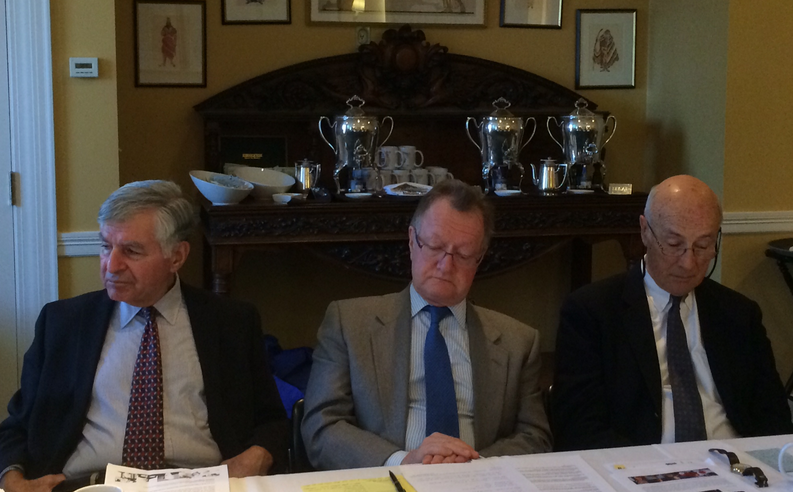
by Admin | Apr 26, 2014 | Event Updates
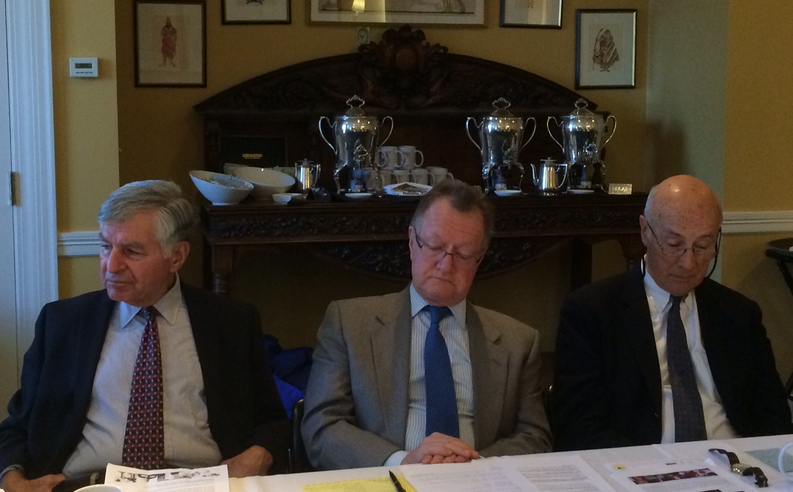
(From Left to Right: Governor Michael Dukakis, Chairman of BGF, Professor John Quelch, Founding Member of BGF’s Board of Directors, and Professor Joseph Nye, member of BGF’s Board of Thinkers)
(BGF) – The Boston Global Forum would like to thank all of the speakers and discussants who participated in April 24th’s fascinating and productive discussion on the conflict between Japan and China, how the conflict can be resolved, and the role of the United States in the dispute. We would also like to thank Professor Joseph Nye and Professor Ezra Vogel for their invaluable guidance during the conference preparations and their insightful introductory comments. Additionally, BGF thanks Professor John Quelch, a founding member of BGF’s Board of Directors, for moderating the great discussion and former Australian Prime Minister Kevin Rudd for his insightful comments and participation.
Finally, we would like to thank our wonderful audience for continuing to engage with BGF and for participating in our online, international conferences. Our conference on April 24th was the first of three conferences BGF will be hosting on the issue of U.S.-Chinese-Japanese relations, with the other two occurring in September and November. We hope you will all continue to engage with BGF on this very important topic, and will participate and support our upcoming conferences later this year. Thank you!

(From Left to Right: Professor Ezra Vogel, Governo Michael Dukakis, and Professor John Quelch)
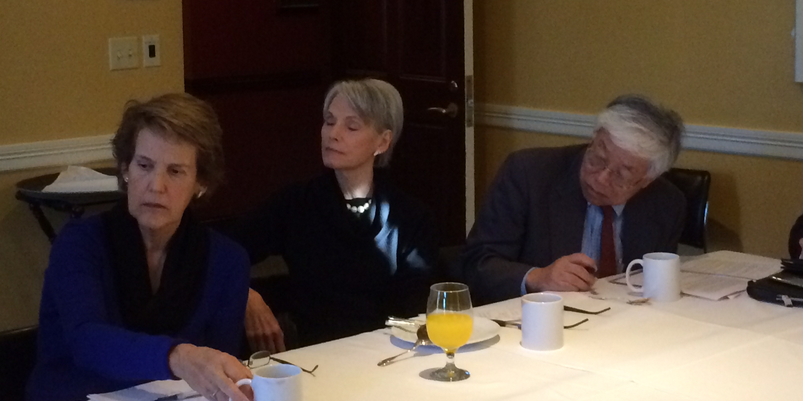
(From Left to Right: Professor Suzanne P. Ogden, Jill Dougherty, Professor Koichi Hamada)
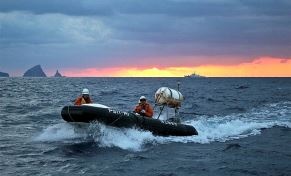
by Admin | Apr 23, 2014 | News

(Photo Credit: Al Jazeera English)
(BGF) – This op-ed, featured in the Washington Post and on Harvard University’s Belfer Center for Science and International Affairs‘ website, discusses the increase in tensions between Japan and China in the context of the dispute over the Senkaku/Diaoyu Islands. According to Professor Joseph S. Nye and Kevin Rudd, the relationship between Japan and China has not been this strained in nearly 50 years. How did Japanese-Chinese relations get here? Nye and Rudd argue that a perception in China that Japan is violating the status quo regarding the Senkaku/Diaoyu Islands and a context of increasing nationalism have pushed the issue to the forefront. How can these tensions be eased? The authors contend that finding a purpose for the islands that is beneficial to both parties, such as declaring them an uninhabited marine ecological preserve. This would ensure that neither Japan nor China can inhabit the islands or use them militarily. An excerpt of the article is provided below. To read the full article click here or visit the Washington Post or Belfer Center website.
How to Navigate the East China Sea Dispute between Japan and China
By Joseph S. Nye and Kevin Rudd
While the world focuses on Ukraine, ships and planes from Japan and China challenge each other almost every day near a few square miles of barren islets in the East China Sea that Japan calls the Senkaku and China calls the Diaoyu islands. This dangerous rivalry dates to the late 19th century, but the flare-up that led to widespread anti-Japan demonstrations in China in September 2012 began when the Japanese government purchased three of the tiny islets from their private Japanese owner. The issue is bound to arise during President Obama’s upcoming visit to Japan.
When the United States returned Okinawa to Japan in May 1972, the transfer included the disputed islets that the United States had administered after 1945. A few months later, when China and Japan normalized their relations in the aftermath of World War II, Japanese Prime Minister Kakuei Tanaka asked Chinese Premier Zhou Enlai about the islands. Zhou replied that rather than let the dispute delay normalization, the issue should be left for later generations. Both countries maintained their claims to sovereignty over the islands.
For decades, this formula worked. Although Japan had administrative control, Chinese ships would occasionally enter Japanese waters to assert their legal position. When incidents occurred, Japan sometimes would detain the Chinese crew members but would soon release them. Exaggerated reports of undersea oil and gas reserves sometimes raised concerns, but as recently as 2008, the two countries agreed on a framework for joint development of disputed gas fields in the East China Sea.
In 2009, relations between China and Japan were improving, and a large delegation of Diet members from the Democratic Party of Japan visited Beijing. Then on Sept. 7, 2010, a Chinese trawler near the islands twice bashed Japanese patrol boats, and Japanese authorities took the trawler to Japan. After several days of Chinese protests, Japan released the crew but brought charges against the captain. China abruptly halted its exports of rare earths to Japan; Japan soon released the captain, but China did not restore these exports for almost two months. When asked why China had reacted that way, Chinese officials said that they had no choice because once Japan brought charges against the captain, it implied acceptance of Japanese law and sovereignty.
To Chinese eyes, Japan destroyed the Zhou-Tanaka status quo with the 2010 arrest and then the 2012 purchase. China also believes that Japan is entering a period of right-wing militarist nationalism and that the purchase of the islands was a deliberate effort by Japan to begin a process of eroding the settlement of World War II. Since 2012, Chinese ships have continued to operate regularly in what Japan claims as its territorial waters. Ironically, these Chinese operations are inflaming Japanese nationalism. And so the spiral of action and reaction continues, with no opportunity in sight for both sides to hit the reset button.
Fast-forward to Prime Minister Shinzo Abe’s December visit to the Yasukuni Shrine, which in part honors Class A Japanese war criminals. Fresh fuel was thrown onto a fire that needed little encouragement. Having watched Sino-Japanese relations closely over many decades, we think it is fair to say things have not been this bad for nearly half a century.
Click here to continue reading.
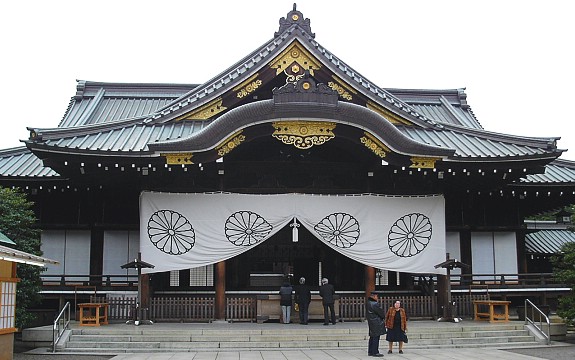
by Admin | Apr 22, 2014 | News

(Photo Credit: www.japan-guide.com)
(BGF) – Yesterday, April 21st, 2014, Japanese Prime Minister Shinzo Abe sent a ritual offering to the Yasukuni Shrine. This article, written by Elaine Lies and featured on the Reuters website, discusses the reaction to Prime Minister Abe’s offering, as well as a recent court order from a Beijing court impounding a Japanese ship, the Baosteel Emotion. The Yasukuni Shrine is viewed by many as a “symbol of Japan’s past militarism” and honors Japan’s dead, including 14 individuals who were declared war criminals for their actions during World War II. In reaction, China and South Korea condemned the offering and expressed anger over Prime Minister Abe’s action. However, the Japanese Government contends that this offering was sent by the Prime Minister as a private individual, and thus the Government could not comment on the offering. Regardless, the offering has strained the already tense relations in the region. Click here to read the full article or visit the Reuters website.
Japan PM makes offering to Yasukuni Shrine, angers China, South Korea
By Elaine Lies
(Reuters) – Japanese Prime Minister Shinzo Abe has sent a ritual offering to the Yasukuni Shrine, seen by critics as a symbol of Japan’s past militarism, angering both South Korea and China on Monday and putting regional ties under further strain.
Adding to unease in the region, a Chinese maritime court in Shanghai seized a ship on Saturday owned by Japanese shipping firm Mitsui O.S.K. Lines, a move that Japan warned could have an adverse impact on its businesses in China.
The court said the company had failed to pay compensation stemming from a wartime contractual obligation. China’s Foreign Ministry said the disagreement was a normal commercial dispute.
Japan said the ship seizure, apparently the first time the assets of a Japanese company have been seized in a lawsuit concerning compensation for World War Two, was “extremely regrettable”.
“It is inevitable that this will have an adverse impact on Japanese companies in China,” said Chief Cabinet Secretary Yoshihide Suga. “We strongly urge the Chinese government to make the proper response.”
The spat over the ship was a “regular business contract dispute”, China’s Foreign Ministry spokesman Qin Gang said, adding that the government would safeguard the rights of foreign investors.
“This case has nothing to do with compensation from the Chinese-Japanese war (World War Two),” Qin told a regular news briefing.
“Nothing has changed in the Chinese government’s position on adhering to, and defending every principle in, the Sino-Japanese Joint Statement,” he added, referring to an announcement in 1972 that the two countries were establishing official ties.
At the time, Japan also recognized the government in Beijing as the sole government of China and China gave up claims to Japanese war reparations.
“China will continue to protect the interests and rights of foreign investors in China according to law,” Qin said.
“MISTAKEN ATTITUDE”
The offering by Abe, who visited the shrine in December but did not go in person this time, was sent just before U.S. President Barack Obama begins a three-day visit to Japan on Wednesday.
The United States has said it was “disappointed” with Abe’s shrine visit last year, which infuriated Beijing and Seoul.
China protested on April 12 after internal affairs minister Yoshitaka Shindo visited the shrine, where 14 Japanese leaders convicted as war criminals by an Allied tribunal after World War Two are honored, along with Japan’s war dead.
Abe made his latest offering to the shrine as a private individual so it was not the government’s place to comment, Suga, the chief government spokesman, told a news conference.
“It will not have an impact on the U.S.-Japan leaders meeting,” he said.
Qin, China’s foreign ministry spokesman, said Beijing had already lodged a protest with Tokyo, adding that Abe’s move reflected Japan’s “mistaken attitude towards history”.
“SLAP IN THE FACE”
China’s official Xinhua news agency condemned Abe’s offering as a provocative move that threatened regional stability and was a “slap in the face of the leader of Japan’s closest ally”.
South Korea’s Foreign Ministry also responded angrily.
“We deplore the fact that Prime Minister Shinzo Abe has romanticized Japanese colonialism and its war of aggression by paying tribute to the Yasukuni Shrine,” it said in a statement, noting it had happened despite expressions of concern from the international community.
Click here to continue reading.

by Admin | Apr 21, 2014 | News

(BGF) – This article, featured on Bloomberg‘s website discusses a recent Chinese court order to impound a Japanese ship, the Baosteel Emotion, as compensation for two Chinese ships leased by Japan in 1937 that were ultimately lost at sea. As the article discusses, this Chinese court order reflects the recent increase in tensions between Japan and China over the Senkaku/Diaoyo Islands and Prime Minister Shinzo Abe’s visit to the Yasukuni Shrine. Consequently, this court order could have negative impacts on Chinese-Japanese economic ties by discouraging business between the two countries. Click here to read the full article or visit Bloomberg‘s website.
China Court Impounds Japanese Ship in Unprecedented Seizure
By Bloomberg News
A Shanghai court ordered the seizure of a Japanese ship owned by Mitsui OSK Lines Ltd. (9104) as compensation for the loss of two ships leased from a Chinese company before the two countries went to war in 1937.
The 226,434-ton Baosteel Emotion was impounded on April 19 at Majishan port in Zhejiang province as part of a legal dispute that began in 1964, the Shanghai Maritime Court and Mitsui OSK said in notices on their websites.
The holding of the ship reflects strained ties between China and Japan amid a territorial dispute over an island chain and visits by Japanese politicians to a Tokyo shrine honoring that country’s war dead. The move is the first time a Chinese court has ordered the seizure of Japanese assets connected to World War II, and could cast a pall over the countries’ trade, according to Shogo Suzuki, a senior lecturer at the University of Manchester in the U.K. who studies China-Japan relations.
“Many of the major Japanese companies like Mitsubishi or Mitsui have existed through back to the pre-war era and could all be implicated in one way or another,” Suzuki said. “Japanese companies can’t extract themselves easily at this stage so I think they’ll be quite worried.”
Disputes have increasingly shifted to the courts, with a Chinese judge accepting a lawsuit last month against two Japanese companies, including Mitsubishi Materials Corp. accused of using forced labor during the war.
Discourage Business
Speaking at a briefing today, Japan’s Chief Cabinet Secretary Yoshihide Suga said the seizure could discourage Japanese companies doing business in China. Mitsui OSK spokesman Atsushi Seki said the company is studying details of the case and trying to come up with a solution.
The dispute had its genesis in 1936, when Mitsui OSK predecessor Daido Kaiun chartered two vessels from Chung Wei Steamship Co., only to have them appropriated by the Japanese government, Mitsui OSK said in a statement today. Both ships were later lost at sea.
The heir of Chung Wei Steamship’s president sued unsuccessfully in Japan in 1964 and 1970, and then took the case to China in the late 1980s. After the maritime court ruled in the plantiff’s favor, Mitsui was seeking an out-of-court settlement when the vessel was “suddenly impounded,” Mitsui OSK said.
Japan argues that China gave up its right to reparations as part of a 1972 joint communique signed when the two countries established diplomatic relations. The communique says China “declares that in the interest of the friendship between the Chinese and the Japanese peoples, it renounces its demand for war reparation from Japan.”
Click here to read the full article.
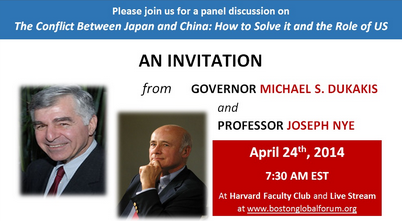
by Admin | Apr 21, 2014 | Event Updates
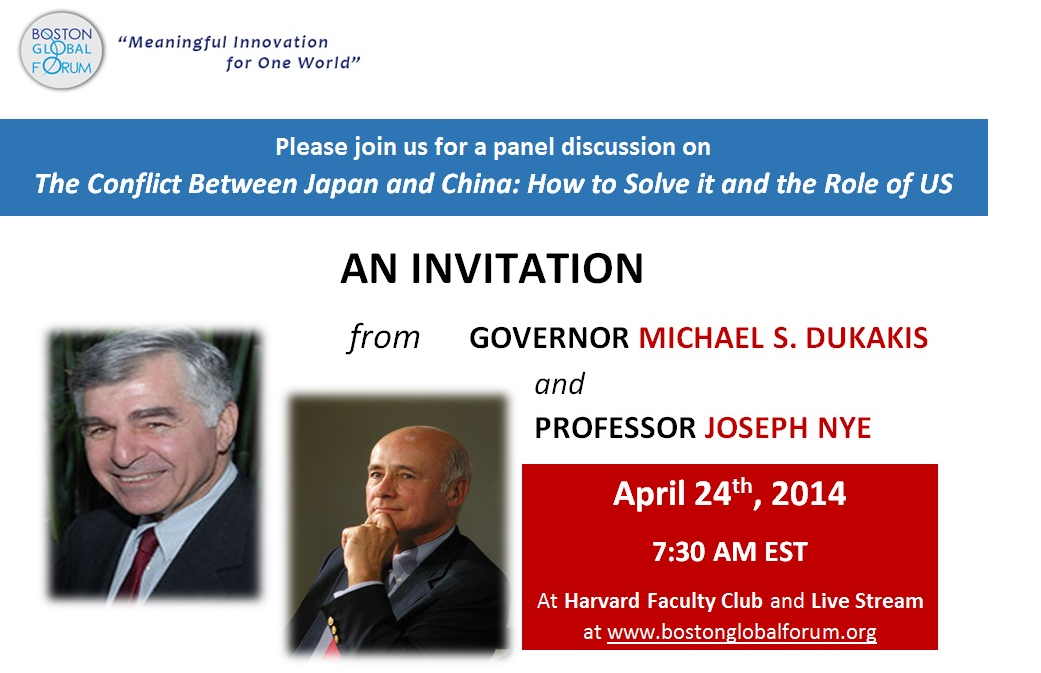
Dear Friends,
Please join us for the first conference of our three-part series on U.S.-China-Japan relations. Professor John Quelch will moderate our discussion featuring prominent scholars on Chinese and Japanese politics and international relations. Professor Nye will join us to add emphasis to the significance of collaboration between the U.S., China, and Japan at such an important time in history. The conference will take place on Thursday, April 24th from 7:30-9:00am, at the Harvard Faculty Club. For those who cannot join us live, the Boston Global Forum will live-stream the event.
It is sure to be a lively and productive conversation, and we hope you can join us.
Sincerely,
Governor Michael Dukakis, Chairman of the Boston Global Forum
Professor Joseph Nye, Member of the Boston Global Forum’s Board of Thinkers


















